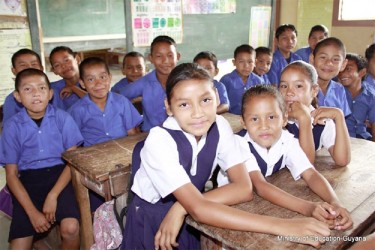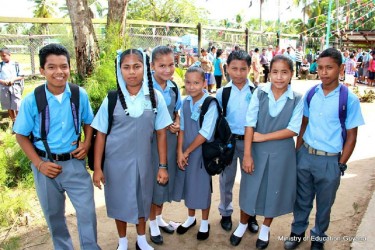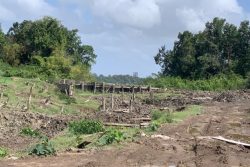September ought to be the most significant month in the lives of school children and in the entire school year. It is the start of everything; starting out at school; starting a new class; starting tertiary and university education. The previous July children who had completed their CXC examinations had come to the end of their days at secondary school. A minority, their CXC grades allowing, would take a tilt at the sixth form. Most of them, however, would explore such other options as their circumstances allowed. Entry into the University of Guyana might be one option. Another might be writing myriad applicatiuons in the hope of being favoured for one of a handful of ‘openings’ that might bring little more than a subsistence level reward. Increasingly these days leaving school means slipping into idleness or crime or else finding some dead end job that suppresses ambitions that might have been there not much earlier.
Come September, those whose days in school had come and gone would miss the sense of belonging that had been created by the uniform which they used to wear, by the classroom camaraderie and by the prerogative of being a carefree school boy or girl.
September would also exhume memories of a phase of their lives that would never come again. It would be a time of mixed emotions for those who had just left school behind. Perhaps more than than anything else there was the peculiar paradox being free of the constrictions of school, on the one hand and, on the other, the sense of apprehension resulting from the realization that being free of school carried with it some intimidating responsibilities.
School, meanwhile, is minding its own business, too busy processing those that had been left behind and those that had just gotten there to bother about those for whom it no longer had any responsibility.

There are myriad things to be done; not least the onerous task of reassembling everything that had been collapsed at the end of the previous school year. The reassembling is a painful process. It would begin with the settling in of the new arrivals, the ones who had showed up with their new uniforms new shoes and socks and haversacks on their backs. The haversacks were almost empty. They would have to wait on the system’s own sweet time for the distribution of books. Meanwhile, they would take their places on unfamiliar seats next to equally unfamiliar faces. Forming friendships would take time.
There is no gradually settling in at the start of September. Even as early as the first week, there is a muted hum in the schools associated with the imminent running –off of ‘school sports. Serious schoolwork would have to wait a while longer.
Years ago there used to be a slogan about ‘sport’ as ‘a nation builder.’ That has long been left behind by our overwhelming failure to create an infrastructure to give meaningful expression to that slogan. Organized athletics in Guyana has long been a national embarrassment. School Sports is an annual exercise in going through the motions, of misusing time that could be more gainfully spent.

This is not a comment on the value of athletics as a means of physical exercise and perhaps even as a pathway to worthwhile careers. Indeed, the experiences of our sister CARICOM countries, notably Jamaica, only serve to underscore our own overwhelming failure and perhaps more pertinently, our inabiliy to incrementally improve the environment in which schoolchildren test their athletic prowess.
Much of the athletics ‘season’ is one of idleness , unwarranted absence from classes and public displays of unseemly behavior by schoolchildren who treat the period as an extension of the July-August holiday.
It is a period during which there is much evidence of a loss of official control in some instances.
School finally commences for the academic year and that, only after the school sports agenda has spent it self.
Those children sitting the Grade 6 Assessment three or four months down the road must begin to work in earnest. The others have a few additional months months before any serious exams are put before them.
What we describe as the September term is by no means the best period in which to make a sound judgment of a child’s academic progress. There is simply too much else that is going on. Save and except those who are determined to hit the ground running at the start of the academic year, the children tend mostly to cruise into Christmas and hope for the best in January. With Christmas behind them they no longer have good reason for avoiding the exertions of the classroom.





